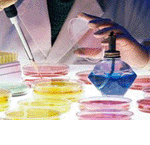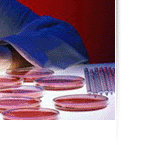Click here to go back.
INVALIDITY OF ANIMAL EXPERIMENTS
Vivisectors continue to rely on animal experiments, even though they continually fail to provide useful information. Even data derived from human research are often applied to animals in the laboratory, with the supposed purpose of seeking results to apply to humans. This is unscientific and unprofessional, and our tax dollars are paying for most of it.
Animal-based safety and toxicity tests currently used have never been validated by the scientific community, and would most likely not pass current validation procedures. Why? Because humans and animals differ greatly from each other: anatomically, genetically, immunologically, physiologically and histologically, right down to the basic cellular structures. You cannot logically or scientifically make predictions for one species with data derived from another. Testing a cancer drug on a mouse or a surgical procedure on a dog gives results that can only be applied to mice or dogs, respectively.
Animals are routinely used as test subjects to study human diseases. Aside from the obvious differences between species, the fundamental problem with this approach is that human diseases occur naturally. Experiments that attempt to artificially re-create in an animal a spontaneously occurring human disease are inevitably innaccurate. The symptoms of a disease can be recreated in an animal, but this synthetically produced “disease” does not duplicate the naturally-occurring human form. Observations and test results obtained from the animal are applicable to that situation only, and cannot be accurately generalized onto humans. Using non-humans to study human conditions is scientifically flawed and careless.
Pharmaceutical drugs are federally mandated to be tested on animals, yet animal-derived data have repeatedly failed to predict the effects of drugs in humans. An FDA drug review states, “Over half of all new medications the FDA approved in a decade were recalled or relabeled because of side effects not observed in animal experiments.” Drug experiments on animals frequently provide data that are subsequently not seen in humans. Conversely, humans frequently exhibit side effects unseen in animal tests, leading scientists back to the labs to attempt to recreate these reactions in animals.
Here are statements made by medical and scientific professionals:
"Work on [the polio vaccine] was long delayed…based on misleading experimental models of the disease in monkeys.” – Albert Sabin, inventor of polio vaccine
Regarding Fleming’s use of penicillin in a human patient, after finding it ineffective in rabbits, and not yet knowing its deadly effect on guinea pigs and hamsters: “How fortunate we didn’t have these animal tests …for penicillin would probably never have been granted a license, and possibly the whole field of antibiotics might never have been realized.” – Howard Florey, co-discoverer and manufacturer of penicillin
“The immunosuppressive effects of cyclosporin have… differed considerably between species, limiting any direct inference that may be made regarding use in human organ transplantation…”1
“This deficiency [of experimentation on humans] has helped foster many misconceptions and myths about the way research is carried out and has led many people to the mistaken impression that all experiments can be - and are - done on animals. Ultimately, however, humans must become test subjects, and the leap from experimenting on animals to experimenting on humans is always a huge one.” 2
“To the 2.6 million people around the world afflicted with multiple sclerosis, medicine has offered more frustration than comfort. Time after time, researchers have discovered new ways to cure laboratory rats of experimental induced encephalomyelitis, the murine model of MS, only to face obstacles in bringing the treatment to humans.” - Scientific American
"... for the great majority of disease entities, the animal models either do not exist or are really very poor. The chance is of overlooking useful drugs because they do not give a response to the animal models commonly used." 3
“Uncritical reliance on the results of animal tests can be dangerously misleading and has cost the health and lives of tens of thousands of humans.” – Handbook of Laboratory Animal Science
1. Annals of Internal Medicine Volume 101 (1984)
2. Lawrence K. Altman M.D., Who Goes First? The Story of Self-Experimentation in Medicine (New York: Random House, 1987).
3. Colin Dollery, Risk-Benefit Analysis in Drug Research, (1981): 7.







